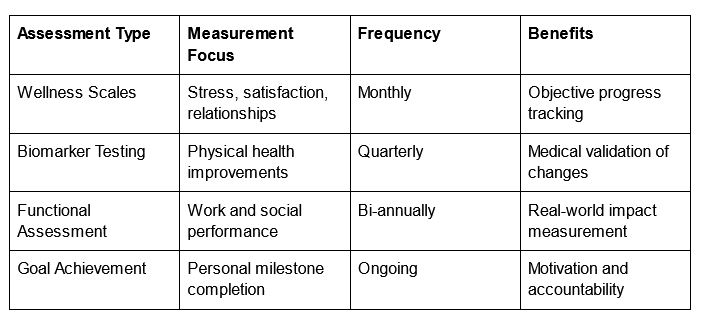How Outpatient Mental Health Services Build a Balanced Lifestyle

Modern life throws curveballs that can knock anyone off balance. Between work demands, family responsibilities, and constant digital notifications, millions of people find themselves struggling to maintain their emotional well-being. Traditional therapy approaches often feel disconnected from real-world pressures, leaving gaps between clinical insights and daily application.
Outpatient mental health services bridge this divide by offering professional support that integrates seamlessly into your existing routine, creating sustainable pathways to wellness that don't require turning your life upside down.
Understanding the Foundation of Balanced Living Through Mental Health Support
Building a truly balanced lifestyle requires more than good intentions; it demands understanding the science behind sustainable change and addressing modern challenges head-on. Today's world presents unique obstacles that previous generations never faced, making professional guidance more valuable than ever.
The Science Behind Lifestyle Balance and Mental Wellness
Your brain's neuroplasticity makes lasting change possible, but only when approached strategically. Research shows that habit formation follows predictable patterns, creating opportunities for mental health support to guide this process effectively. The relationship between lifestyle choices and emotional regulation works both ways; better choices improve mood, while improved mood makes better choices easier.
Clinical evidence consistently demonstrates the effectiveness of structured approaches. Since the onset of the COVID-19 pandemic, 22.6% of children have reported experiencing symptoms of depression, while 18.9% have reported symptoms of anxiety. This data highlights how external pressures directly impact mental wellness, making professional guidance crucial for recovery.
Modern Lifestyle Challenges That Outpatient Services Address
Digital overwhelm has become a constant companion for most people. Social media platforms trigger comparison cycles that undermine self-worth, while endless notifications fragment attention and disrupt sleep patterns. Many individuals can't distinguish between productive screen time and mindless scrolling.
When these disruptions persist for weeks and begin to affect daily functioning, they may indicate a clinical condition such as major depressive disorder. Distinguishing between situational low mood and a persistent depressive disorder helps guide appropriate care and timely referrals. A concise resource outlining common symptoms and evidence-based options — from psychotherapy and medication to newer interventions like TMS and ketamine — can help readers understand when to seek professional evaluation. Early assessment often improves recovery trajectories and daily functioning.
Work-from-home arrangements blur boundaries between professional and personal space. Without a clear separation, many people struggle to "turn off" work mode, leading to chronic stress and relationship strain. Financial uncertainty adds another layer of complexity, creating anxiety that affects decision-making and future planning.
In Seattle, the intersection of modern pressures and unique environmental factors is particularly evident. The Pacific Northwest's extended gray seasons can compound mood challenges, while the tech-heavy economy creates high-stress work cultures. Outpatient Mental Health Services In Seattle, WA are designed to help residents navigate these local stressors by providing professional support that is both flexible and tailored to the needs of busy professionals, allowing them to effectively manage both career and family obligations.
Core Pillars of Balanced Lifestyle Development in Outpatient Mental Health Services
Creating sustainable lifestyle changes requires a structured approach that addresses thinking patterns, emotional responses, and daily behaviors. These three interconnected areas form the foundation of lasting transformation.
Cognitive Restructuring for Sustainable Life Changes
Perfectionism sabotages balance by setting impossible standards that guarantee failure. Professional guidance helps identify these unrealistic expectations and replace them with achievable goals. Growth mindset approaches reframe setbacks as learning opportunities rather than evidence of personal inadequacy.
Reality-testing techniques provide tools for evaluating overwhelming situations objectively. When anxiety makes problems seem insurmountable, structured questioning reveals manageable action steps. Cognitive flexibility training prepares individuals for life transitions, reducing the stress that accompanies change.
Emotional Regulation Mastery for Daily Life Integration
Advanced mindfulness goes beyond basic meditation apps. Professional instruction teaches specific techniques for different emotional states, creating a personalized toolkit for real-world situations. Emotional wellness develops through understanding emotional granularity, recognizing subtle differences between feelings like frustration and disappointment.
The window of tolerance expansion helps individuals handle increasingly challenging situations without becoming overwhelmed. Real-time regulation strategies provide immediate relief during acute stress, while technology integration connects these skills to daily life through specialized apps and monitoring tools.
Behavioral Activation Strategies for Lifestyle Momentum
Values-based activity scheduling ensures that daily actions align with personal priorities. This approach prevents the common trap of staying busy without making meaningful progress. Overcoming behavioral inertia starts with micro-commitments that build confidence through consistent small wins.
Recent research highlights that 12.4% of Thai psychiatrists and psychiatry trainees are experiencing depression, with rates being 13.9% among psychiatrists and 7.7% among trainees. This demonstrates how even mental health professionals need structured support systems to maintain their own well-being, emphasizing the importance of accountability systems that actually work rather than adding pressure.
Benefits of Outpatient Therapy for Sustainable Lifestyle Transformation
The benefits of outpatient therapy extend far beyond traditional counseling sessions, offering practical advantages that make lasting change possible for busy individuals.
Flexibility That Accommodates Real-Life Responsibilities
Career advancement doesn't pause for mental health recovery. Outpatient scheduling accommodates professional demands through evening and weekend options, ensuring that seeking help doesn't jeopardize work performance. Virtual therapy expands accessibility for parents juggling childcare responsibilities or professionals with unpredictable schedules.
Intensive programs provide concentrated support during challenging periods without requiring extended leave from work or family obligations. Integration with workplace mental health benefits streamlines the process, often providing financial advantages that make comprehensive care affordable.
Cost-Effective Path to Comprehensive Lifestyle Change
Insurance coverage optimization strategies help individuals maximize their benefits while minimizing out-of-pocket expenses. The return on investment becomes clear when comparing therapy costs to lifestyle-related health expenses like stress-induced medical issues or productivity losses.
Sliding scale options and community resources ensure that financial constraints don't prevent access to quality care. Employer-sponsored programs increasingly recognize the value of mental health support, offering additional pathways to affordable treatment.
Gradual Integration vs. Disruptive Life Overhauls
Habit stacking techniques attach new behaviors to existing routines, making change feel natural rather than forced. This approach prevents therapy burnout by allowing gradual progression at a sustainable pace. Building resilience during the change process ensures that temporary setbacks don't derail long-term progress.
Maintaining progress during life stressors becomes possible when coping strategies are already integrated into daily routines. This preparation makes individuals more resilient when unexpected challenges arise.
Innovative Lifestyle Balance Strategies Unique to Outpatient Settings
Modern outpatient mental health services incorporate cutting-edge approaches that weren't available in traditional therapy settings, creating new possibilities for sustainable lifestyle change. For instance, many Outpatient drug treatment in Woodland Hills programs (or elsewhere) can offer flexible schedules, personalized therapy sessions, and ongoing support that may allow individuals to maintain daily responsibilities while working on recovery and developing healthier routines.
Technology Integration for Enhanced Mental Health Support
AI-powered mood tracking identifies patterns that might otherwise go unnoticed, providing data-driven insights for treatment planning. Virtual reality exposure therapy addresses social anxiety and lifestyle fears in controlled environments, building confidence for real-world application.
Biometric integration monitors stress levels throughout the day, triggering timely interventions before situations become overwhelming. Mental health apps complement therapy sessions by providing between-session support and skill practice opportunities.
Community-Based Peer Support Networks
Group therapy dynamics create accountability that individual sessions can't replicate. Peer mentorship programs pair individuals with similar challenges, providing ongoing motivation through shared experiences. Online support communities, moderated by professionals, extend support beyond scheduled appointments.
Family and couples integration recognizes that balanced lifestyle changes affect entire household systems. Including loved ones in treatment planning increases success rates and reduces relationship strain during the change process.
Cultural and Identity-Affirming Approaches to Balance
Culturally responsive therapy techniques ensure that treatment recommendations align with personal values and cultural backgrounds. LGBTQ+ affirming practices support authentic lifestyle alignment without requiring individuals to compromise their identity.
Intergenerational trauma healing addresses inherited patterns that sabotage lifestyle balance across family lines. Spiritual and religious integration, when appropriate, honors existing belief systems while promoting positive change.
Measuring Progress and Maintaining Long-Term Lifestyle Balance
Tracking improvement requires more than subjective feelings; standardized assessments provide objective measures of change, while preventing relapse protects long-term investment in wellness.
Evidence-Based Assessment Tools for Lifestyle Improvement
Standardized wellness scales quantify progress in areas like stress management, relationship quality, and life satisfaction. Biomarker improvements through lifestyle changes provide concrete evidence of health benefits, reinforcing motivation to continue positive behaviors.
Social and occupational functioning assessments measure real-world impact rather than just symptom reduction. Quality of life measurements and goal achievement tracking ensure that therapy translates into meaningful life improvements.
Relapse Prevention and Crisis Management Strategies
Early warning systems help individuals recognize signs of lifestyle disruption before they become overwhelming. Emergency coping strategies provide immediate tools for major life stressors, preventing temporary challenges from derailing progress.
Building resilience reserves during stable periods creates resources for unexpected difficulties. Transitioning from intensive to maintenance care ensures continued support without creating dependency on professional services.

Graduating to Independent Lifestyle Management
Developing an internal locus of control ensures that individuals can maintain progress without constant professional oversight. Building a personal therapy toolkit provides ongoing resources for managing future challenges independently.
Creating sustainable support networks beyond formal therapy maintains connection and accountability. Long-term follow-up and booster sessions provide safety nets during major life transitions.
Finding the Right Outpatient Mental Health Services for Your Lifestyle Goals
Choosing appropriate care requires understanding different program types and asking informed questions that reveal whether specific services match individual needs.
Evaluating Program Types and Specializations
Intensive Outpatient Programs provide higher levels of support than standard therapy while maintaining scheduling flexibility. Specialized tracks for anxiety, depression, trauma, and lifestyle disorders ensure targeted treatment approaches.
Integrative approaches combining multiple therapeutic modalities address complex challenges that single-method treatments might miss. Evidence-based program selection criteria help individuals make informed decisions about their care.
Your Questions About Balanced Living Through Mental Health Support
- How do you nurture mental health for a balanced life?
Nurturing mental health requires consistent self-care practices, regular physical activity, quality sleep, meaningful social connections, stress management techniques, and professional support when needed. Small daily actions create significant long-term improvements in overall well-being and life satisfaction.
- How effective are mental health services?
Research consistently demonstrates positive outcomes, with 63% of individuals reporting that mental health providers helped them significantly. Additionally, 65% found that professional care positively impacted their quality of life, indicating measurable benefits from structured mental health interventions.
- What makes outpatient services different from other treatment options?
Outpatient services allow individuals to maintain work, family, and social responsibilities while receiving professional support. This approach integrates treatment into daily life, creating sustainable changes without the disruption of residential programs or intensive interventions.


